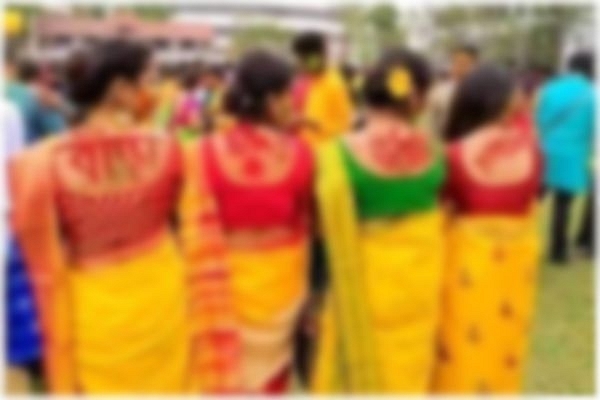Culture
Vulgarity During Basanta Utsav Celebrations In Kolkata Symptomatic Of Deep Rot In Bengali Society
- What happened at the Ravindra Bharati University is, sadly, not surprising.

Basant Utsav at Rabindra Bharati University
A huge controversy has erupted over Basanta Utsav (spring festival) celebrations at the state-run Rabindra Bharati University (RBU) campus in Kolkata on Thursday.
The RBU is associated with Rabindranath Tagore, who started the festival to mark Holi at the Vishwa Bharati University that he set up in Shantiniketan.
A group of youngsters--RBU authorities and students say they were outsiders--sang and danced to a vulgar parody of a Rabindrasangeet piece (songs penned by Tagore, who also gave musical notes to his lyrics) at the celebrations in RBU campus on Thursday.
Some of these youngsters, including women in their 20s, had vulgar words written on their backs and chests with abir (gulal).
Videos of the song and photos of the vulgarity went viral, inviting scathing criticism from many.
The heat generated over the outrageous incident led to RBU Vice Chancellor Sabyasachi Basu Roychowdhury tendering his resignation.
Bengal education minister Partha Chatterjee and many others condemned the incident and on Friday, five of the youngsters seen in the video were detained by the police.
The incident has evoked howls of condemnation and censure. Renowned Rabindrasangeet exponent Sraboni Sen said the incident is condemnable and has “tarnished the name of Rabindra Bharati University”.
“This is a very sad day. We never expected this would happen in the land of Tagore, in the university associated with research on the bard,” said eminent linguist Nrisingha Prasad Bhaduri.
But the incident--young and educated men and women (all Bengali Hindus) displaying vulgar and cuss words on their bodies and dancing and singing to a hideous song--is not just about insulting Tagore. It goes much beyond that.
The unfortunate incident is symptomatic of a deep rot that has set in Bengali Hindu society for some time now. Bengali Hindus, have moved away from their rich cultural and religious moorings.
That is why the parody of the Rabindrasangeet by one Roddur Roy that was played at the Basanta Utsav celebrations gets lakhs of ‘likes’ and shares on Youtube.
Roy, a self-proclaimed substance-abuser, is a sort of a cult figure among young Bengali Hindu boys and girls.
His parodies of songs penned by Tagore, his irreverent renditions of many other songs and lampooning of prominent Bengali personas are widely shared and gets tens of thousands of ‘likes’.
His Facebook page has tens of thousands of followers and some of the parodies are even re-mixed and played at pubs in the state.
“The songs he renders while openly smoking marijuana are extremely distasteful. While he has the artistic freedom to do whatever he likes, it speaks volumes about the degeneration of Bengali society that Roddur Roy’s parodies have become so popular among the youth,” lamented sociologist and commentator Prosun Roy.
Roddur Roy’s songs, or corruption of Rabindra Sangeet, is an assault on one’s sensibilities, says Tagore scholar Ipsita Ganguly. “But since many of the present generation like his ‘creations’, it shows how much tastes and sensibilities have declined,” she said.
“To a large extent, this is the result of leftist ideology that has taken deep roots in Bengal. That ideology promotes irreverence towards established icons, values, religion and spirituality since such irreverence is essential for the toxic ideology to strike roots in a person’s intellect,” explained political science teacher Jawahar Bhattacharya.
Sociologist Pulin Karmakar says that parents are equally to blame for this sorry state of affairs. “Bengali Hindu parents don’t give any importance at all to teaching their children about their culture, religion and traditions,” he said.
“The children thus become culturally wayward and take to a distorted and degenerate culture. The incident at Rabindra Bharati is a manifestation of this,” Karmakar added.
Culture, says religious scholar Deben Mullick, is closely related to religion. “In the lopsided and confused quest for imparting ‘secular’ education, Bengali Hindu parents have completely ignored the very important task of imparting religious education to their children. That has led to the deracination of Bengalis, especially those belonging to the present generation,” said Mullick.
Few among Bengali Hindus, especially those below 40 years of age, are religious and spiritual. “Bengali Hindus who are in their 30s and 40s today grew up in the 1980s and 1990s and that was the time communism took strong and deep roots in Bengal,” observes sociologist Sunando Maity.
“The detachment from culture, religion and traditions of that generation got only wider and stronger with the generation after them (who are the young adults today) and, hence, the popularity of so-called singers like Roddur Roy who churn out vulgar trash. That is also why the present generation finds it ‘cool’ to display vulgar words and terms on their bodies,” said Mullick.
The scholars are unanimous in their view that the rot that has set in among Hindu Bengalis will take a long time, and deliberate collective action, to stem.
But going by the present trend in Bengali Hindu society, there is no hope for that happening any time soon.
Introducing ElectionsHQ + 50 Ground Reports Project
The 2024 elections might seem easy to guess, but there are some important questions that shouldn't be missed.
Do freebies still sway voters? Do people prioritise infrastructure when voting? How will Punjab vote?
The answers to these questions provide great insights into where we, as a country, are headed in the years to come.
Swarajya is starting a project with an aim to do 50 solid ground stories and a smart commentary service on WhatsApp, a one-of-a-kind. We'd love your support during this election season.
Click below to contribute.
Latest